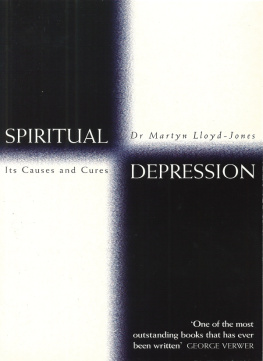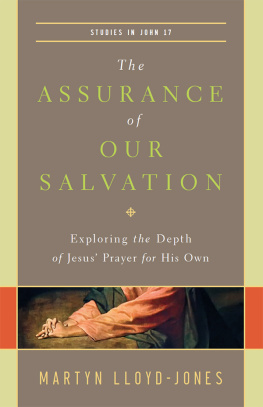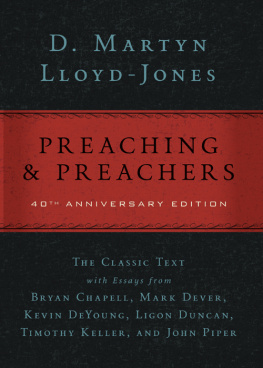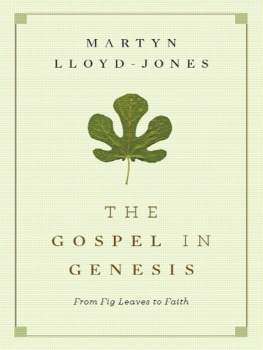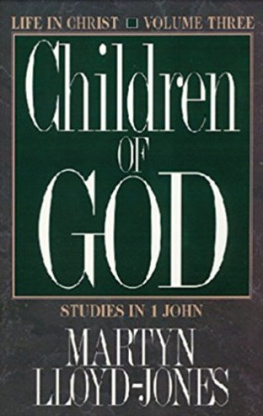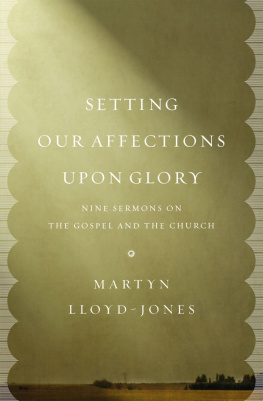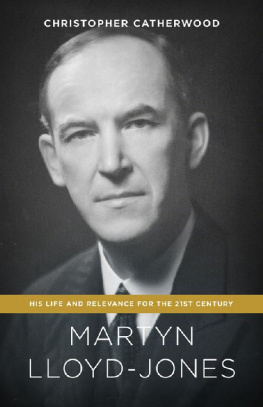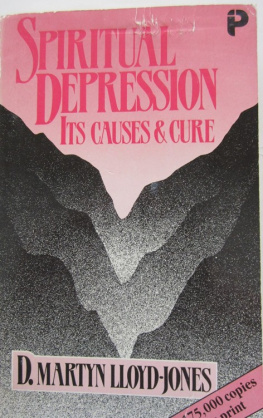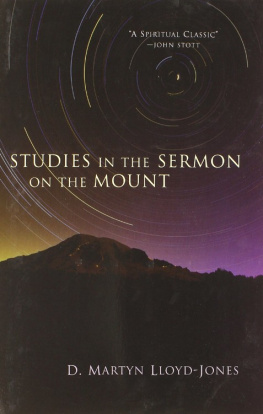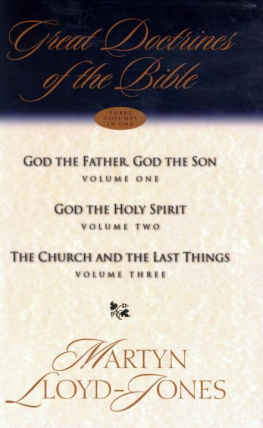Marshall Pickering is an imprint of
HarperCollins Religious
Part of HarperCollins Publishers
7785 Fulham Palace Road, London W6 8JB
First published in Great Britain in 1965
by Pickering and Inglis Ltd
This edition 1998
5 7 9 10 8 6
Copyright 1965 D. Martyn Lloyd-Jones
The author asserts the moral right to
be identified as the author of this work
A catalogue record for this book
is available from the British Library
ePub Edition December 2015: ISBN 978-0-3105-3101-2
CONDITIONS OF SALE
This book is sold subject to the condition that it shall not, by way of trade or otherwise, be lent, re-sold, hired out or otherwise circulated without the publishers prior consent in any form of binding or cover other than that in which it is published and without a similar condition including this condition being imposed on the subsequent purchaser.
All rights reserved. No part of this publication may be reproduced, stored in a retrieval system, or transmitted, in any form or by any means, electronic, mechanical, photocopying, recording or otherwise, without the prior permission of the publishers.
To
ANN
CONTENTS
CHAPTER
BY GEORGE VERWER
I believe that this is one of the most outstanding books that has ever been written. If someone is looking for a book that is cutting-edge, and yet balanced, this is it!
I will always remember the occasion in the late 70s when Dr Lloyd-Jones visited our ship, M. V. Doulos, in London, and shared a powerful message from Gods Word. I also remember visiting Westminster Chapel and hearing him expound Gods Word in a very clear and powerful way.
For over 30 years I have urged people to read this book. I have often told great crowds, in many countries, that it is the greatest Christian book of all time. This has usually led to every available copy being sold.
I think the title has confused or frightened some people because they were thinking in terms of depression in a particular way. This book is really a mini-encyclopedia on how to know God and walk with God.
I know many younger people have never heard Dr Martyn Lloyd-Jones, even though his tapes are in wide circulation. It is my prayer that this book will introduce them to his unique ministry. I recommend that you dont read too much at once and that you try to meditate on the concepts and challenges. This book has been used to change many lives, but I believe it needs to be read with a spirit of honesty and openness.
Im hoping that you will want to get extra copies to give to your friends, for the message of this book is as relevant today as it has ever been.
These sermons were preached on consecutive Sunday mornings at Westminster Chapel and are here reproduced virtually as they were delivered,
The need for them arose as the result of pastoral experience, and they are now published in book form largely as the result of repeated requests that they might be issued in this form.
Believing as I do that the greatest need of the hour is a revived and joyful Church the subject dealt with in these sermons is to me of the greatest possible importance. Unhappy Christians are, to say the least, a poor recommendation for the Christian Faith; and there can be little doubt but that the exuberant joy of the early Christians was one of the most potent factors in the spread of Christianity.
The treatment of the subject is by no means exhaustive. I have tried to deal with what I have found to be the commonest causes of trouble. In several instances (e.g., the relationship between the physical, the psychic, and the spiritual) I would have liked to deal with the problem more thoroughly, but that was hardly possible in a sermon. In any case sermons are not intended for the experts but for the common people and those who are in need of help.
I pray that God will bless them to all such.
All who may derive some help from them will want to join with me in thanking Mrs. Hutchings who originally took down the sermons in shorthand, and my wife who looked after corrections, proof-reading, etc.
D. M. LLOYD-JONES
Why art thou cast down, O my soul? and why art thou disquieted in me? hope thou in God: for I shall yet praise Him for the help of His countenance.
Psalm 42. 5
Why art thou cast down, O my soul? and why art thou disquieted within me? hope thou in God: for I shall yet praise Him, who is the health of my countenance and my God.
Psalm 42. 11
T HE simplest description of the five books of Psalms is that they were the inspired prayer-and-praise book of Israel. They are revelations of truth, not abstractly, but in the terms of human experience. The truth revealed is wrought into the emotions, desires, and sufferings of the people of God by the circumstances through which they pass.
It is because that is such a true description of them that the Psalms have always proved to be a great source of solace and encouragement to Gods people throughout the centuriesboth the children of Israel and the members of the Christian Church
Here we are able to watch noble souls struggling with their problems and with themselves. They talk to themselves and to their souls, baring their hearts, analysing their problems, chiding and encouraging themselves. Sometimes they are elated, at other times despressed, but they are always honest with themselves. That is why they are of such real value to us if we also are honest with ourselves.
In this particular Psalm which we propose to consider the Psalmist is unhappy and in trouble. That is why he cries out in the dramatic words: Why art thou cast down, O my soul? and why art thou disquieted in me? hope thou in God; for I shall yet praise Him, who is the health of my countenance, and my God.
This statement, which we have twice in this Psalm, is found also in the following Psalm, Some regard Psalm 43 as being part of the same statement and not a separate Psalm. It is a matter which cannot be decided, and it is quite immaterial, but in both these Psalms this statement is repeated, for we find it at the end of Psalm 43 as well.
The Psalmist is giving an account of his unhappiness, the unhappiness of his soul, the condition through which he was passing when he wrote these words. He tells us the cause of that unhappiness. Probably at that particular time he was prevented from joining with others in public worship in the House of God. But not only that, he was clearly being attacked by certain enemies. There were those who were doing their utmost to depress him and he gave an account of that. We are interested chiefly, however, in the way in which he faces the situation, and the way in which he deals with himself.
Our subject, in other words, is that which we may describe as spiritual depression, its causes and the way in which it should be treated. It is interesting to notice the frequency with which this particular theme is dealt with in the Scriptures and the only conclusion to be drawn from that is that it is a very common condition. It seems to be a condition which has afflicted Gods people right from the beginning, for you find it described and dealt with in the Old Testament and in the New. That in itself would be sufficient reason for drawing your attention to it, but I do so also because it seems in many ways to be the peculiar trouble with many of Gods people and the special problem troubling them at this present time.
There are many reasons for that. One of the main ones being, undoubtedly, the terrible events which we have lived through in this generation, the two wars and the consequent upheavals. That is not by any means the sole reason, but I have no doubt it is partly responsible. But whatever the reason, the fact remains that there are large numbers of Christian people who give the impression of being unhappy. They are cast down, their souls are disquieted within them, and it is because of that that I am calling attention to the subject.
Next page
